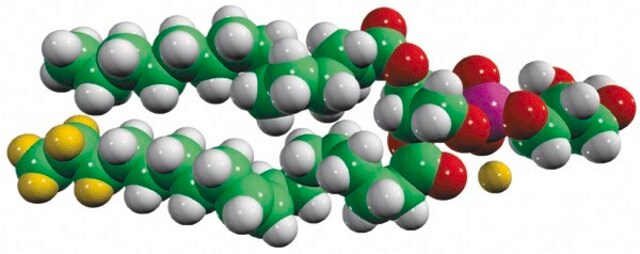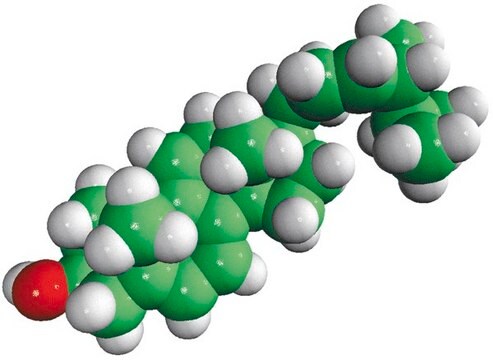800812C
Avanti
12:0 DG
1,2-dilauroyl-sn-glycerol, chloroform
Synonym(s):
1,2-didodecanoyl-sn-glycerol; DG(12:0/12:0/0:0); 110611
About This Item
Recommended Products
Assay
>99% (TLC)
form
liquid
packaging
pkg of 2 × 4 mL (800812C-200mg)
pkg of 1 × 5 mL (800812C-10mg)
manufacturer/tradename
Avanti Research™ - A Croda Brand 800812C
concentration
2 mg/mL (800812C-10mg)
25 mg/mL (800812C-200mg)
lipid type
neutral lipids
neutral glycerides
shipped in
dry ice
storage temp.
−20°C
InChI
1S/C27H52O5/c1-3-5-7-9-11-13-15-17-19-21-26(29)31-24-25(23-28)32-27(30)22-20-18-16-14-12-10-8-6-4-2/h25,28H,3-24H2,1-2H3/t25-/m0/s1
InChI key
OQQOAWVKVDAJOI-VWLOTQADSA-N
General description
Application
- as an internal standard for spiking serum samples for liquid chromatography–mass spectrometry analysis.
- as an internal standard for spiking RAW 264.7 cells for mass spectroscopy studies
- as standard in reverse-phase liquid chromatography coupled mass spectrometer for lipidomics studies of human plasma and serum samples
Biochem/physiol Actions
Packaging
Storage and Stability
Other Notes
Dry samples of diacylglycerol in chloroform, using a stream of nitrogen. Dissolve the residue in an appropriate volume of ethanol or DMSO, then dilute to the desired aqueous medium.
Most biological responses saturate at 20 to 250 μM sn-1,2-dioctanoylglycerol. Only sn-1,2 isomers appear to be active.
Legal Information
also commonly purchased with this product
Signal Word
Danger
Hazard Statements
Precautionary Statements
Hazard Classifications
Acute Tox. 3 Inhalation - Acute Tox. 4 Oral - Carc. 2 - Eye Irrit. 2 - Repr. 2 - Skin Irrit. 2 - STOT RE 1 Oral - STOT SE 3
Target Organs
Central nervous system, Liver,Kidney
Storage Class Code
6.1D - Non-combustible acute toxic Cat.3 / toxic hazardous materials or hazardous materials causing chronic effects
WGK
WGK 3
Flash Point(F)
does not flash
Flash Point(C)
does not flash
Choose from one of the most recent versions:
Certificates of Analysis (COA)
Sorry, we don't have COAs for this product available online at this time.
If you need assistance, please contact Customer Support.
Already Own This Product?
Find documentation for the products that you have recently purchased in the Document Library.
Our team of scientists has experience in all areas of research including Life Science, Material Science, Chemical Synthesis, Chromatography, Analytical and many others.
Contact Technical Service










